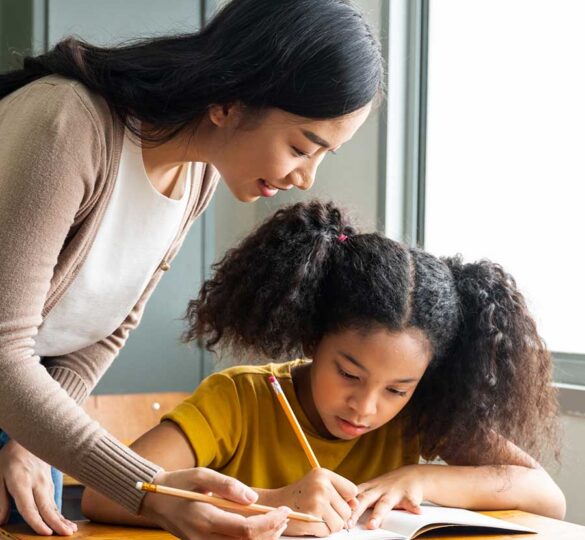Tips To Help a Child With Glaucoma in the Classroom
If your child has glaucoma or a child in your classroom has it, you may wonder how the condition affects their ability to learn in school.

Glaucoma can be difficult for some children to handle on their own, but with the proper support from teachers and parents, most children can succeed in school and grow into healthy adults.
Some children with glaucoma may experience difficulties in school. Explore what resources are available in your area. Many communities provide special education funding and services to meet the needs of visually impaired children.
Another essential aspect of helping a child with glaucoma is ensuring they feel comfortable in school. An excellent way to do this is by providing the school with a copy of your child’s health plan, which includes information about how you want their needs met at school.
You might also want to provide a copy of your child’s vision plan and Individualized Educational Plan (IEP) and any additional accommodations they may have, so teachers can help your child succeed in class.
Parents of children with glaucoma should also work closely with teachers to ensure the child is getting the support needed for success at school. Teachers can help parents understand how their child’s vision problems might affect academic performance, self-esteem, and learning in general. Teachers should be aware of these issues and have strategies to help children with glaucoma do their best in school.
Why Visual Skills Are Necessary for Learning
Up to 80% of classroom learning is vision-based, making it challenging for children with low vision. Vision skills include eye teaming, tracking, accommodation, and focusing, which are all critical for proficient reading, writing, and reading comprehension.
Parents and teachers of school-aged children with poor visual skills can implement strategies to accommodate and improve students’ academic performance. Keep reading for tips for helping a child with glaucoma in the classroom.
9 Tips To Help a Child With Glaucoma in the Classroom:
- To avoid glare, teach your child to sit with their back to the windows or other bright light.
- Request that teachers present educational materials against a simple background. Keep the work area uncluttered.
- Talk with the teacher about flexible seating, which may mean moving closer to the front of the classroom, especially if visual props are used.
- Encourage the use of materials with high contrast and bold writing.
- During outdoor playtime, teach your child to use sunglasses and hats. Even overcast days can cause glare in the eyes.
- Have your child wear protective goggles during activities.
- Include ideas that enhance your child’s learning style and ability. If needed, use a Closed-Circuit Television (CCTV) for enlarging print.
- If you have any areas of concern, consult with an educator, occupational therapist, or low vision specialist to evaluate your child’s home and school environment. These evaluations can give you essential information about your child’s areas of strength and areas that need support services.
- Develop a support system with your family and friends. Also, look into community groups and agencies that provide support groups and other resources.
Help Your Child Feel Comfortable in School
- Ensure that your child feels comfortable with their teacher. Your child will likely feel more relaxed if they know the teacher’s name and can rely on them for help. The teacher should also be able to provide information about your child’s individual needs to other members of the school staff, such as secretaries or nurses.
- It’s essential that your child feels like they belong at school. When they’re comfortable, they’ll feel more confident in the classroom. In addition, it may be helpful for you to join parent clubs to can meet other parents and children with similar interests and support each other during those big moments.
- If possible, speak with teachers and school administrators about what accommodations might be needed to ensure that your child’s needs are covered. For example, it may also be beneficial to request that tests not be scheduled close together to avoid multiple consecutive days where stress levels rise dramatically due to too many difficult tasks being asked of them all at once.
Invest in Supplies That Make School Easier for Your Child
As a parent, you can help your child by getting them the right supplies:
- A good magnifier. High-power magnifiers are best because they enable clearer vision over greater distances, but this may not be possible with some younger children. In that case, go for what’s available to you in your town or city.
- Whiteboard markers (or dry erase markers) can be beneficial because they allow easier writing on any surface, including a whiteboard or blackboard.
How Can I Help My Child Who Has Glaucoma With Schoolwork?
Another helpful thing you can do is provide copies of your child’s work — including homework assignments and projects — so teachers can easily see what skills they have mastered, which ones need more work, and where they may need more support from an outside tutor.
Help Us Find a Cure
Children with glaucoma can accomplish academic success and lead vibrant and full lives. In addition, parents can gain useful knowledge about pediatric glaucoma to ensure they’re doing everything possible to help their child diagnosed with it.
Your support can help dedicated researchers continue to discover the causes and cures for glaucoma. Your contributions of cash, stock, vehicles, or boats give hope to those living with glaucoma and accelerate our search for a cure. With your help, the cure is in sight!
Posted on October 4, 2022